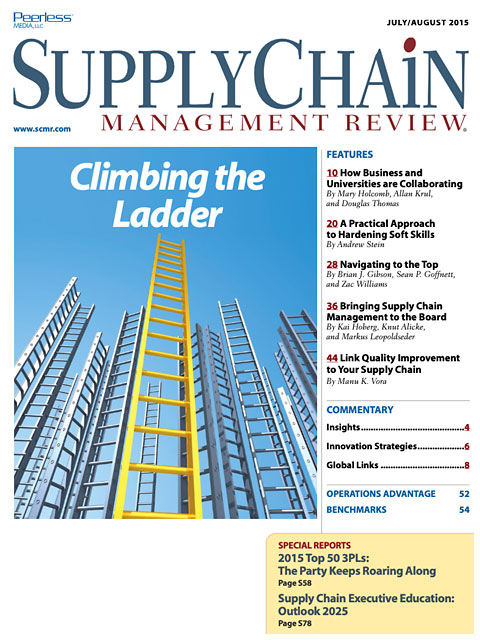Sorry, but your login has failed. Please recheck your login information and resubmit. If your subscription has expired, renew here.
July/August 2015
When it comes to career development, supply chain managers have to execute a bit of jiu jitsu. They’re charged with nding and developing the next generation of talent while simultaneously advancing their own careers in a eld that is often overlooked by senior management. The biggest challenge of all is getting their agenda in front of the Board at a time when supply chain operations are more critical than ever to an organization’s success, but still largely invisible compared to sales, marketing, and product development. Remember: It’s your career—and your supply chain. We hope this month’s issue will help you make the most of both. Browse this issue archive.Need Help? Contact customer service 847-559-7581 More options
You know the type: hard-working bosses who are bright, but poor leaders and terrible communicators. Their business cards are adorned with all kinds of certifications; they’re logistics experts, procurement supremos, or inventory geniuses. They get stuff done! But they could get so much more done if only they played well in teams.
In short, they have truckloads of hard skills but they’re pitifully short of the soft skills that are so much more necessary in today’s volatile, fast-paced, globalized world.
To some extent, their education and training have not prepared them well enough. While there is no shortage of resources for teaching and developing the technical skills required to become a supply chain professional—university programs, APICS certification, and in-house training programs—there is far less obvious support for organizations that want to enable their supply chain experts to develop skills in areas such as leadership, communication, and teamwork.
 |
This complete article is available to subscribers
only. Click on Log In Now at the top of this article for full access. Or, Start your PLUS+ subscription for instant access. |
SC
MR
Sorry, but your login has failed. Please recheck your login information and resubmit. If your subscription has expired, renew here.
July/August 2015
When it comes to career development, supply chain managers have to execute a bit of jiu jitsu. They’re charged with nding and developing the next generation of talent while simultaneously advancing their own careers… Browse this issue archive. Access your online digital edition. Download a PDF file of the July/August 2015 issue.
 |
Download Article PDF |
You know the type: hard-working bosses who are bright, but poor leaders and terrible communicators. Their business cards are adorned with all kinds of certifications; they're logistics experts, procurement supremos, or inventory geniuses. They get stuff done! But they could get so much more done if only they played well in teams.
In short, they have truckloads of hard skills but they're pitifully short of the soft skills that are so much more necessary in today's volatile, fast-paced, globalized world.
To some extent, their education and training have not prepared them well enough. While there is no shortage of resources for teaching and developing the technical skills required to become a supply chain professional—university programs, APICS certification, and in-house training programs—there is far less obvious support for organizations that want to enable their supply chain experts to develop skills in areas such as leadership, communication, and teamwork.
 |
SUBSCRIBERS: Click here to download PDF of the full article. |
SC
MR

Latest Supply Chain News
- Retail sales see gains in October, reports Commerce and NRF
- Balancing green and speed: Home delivery insights from the pandemic era
- AdventHealth named top healthcare supply chain by Gartner
- Geopolitical readiness in supply chains: Strategic challenges for leaders
- Unlocking retention: The role employee engagement plays
- More News
Latest Podcast

 Explore
Explore
Topics
Latest Supply Chain News
- Retail sales see gains in October, reports Commerce and NRF
- Balancing green and speed: Home delivery insights from the pandemic era
- AdventHealth named top healthcare supply chain by Gartner
- Geopolitical readiness in supply chains: Strategic challenges for leaders
- Unlocking retention: The role employee engagement plays
- Can supply chain managers embrace an entrepreneurial mindset?
- More latest news
Latest Resources

Subscribe

Supply Chain Management Review delivers the best industry content.

Editors’ Picks





